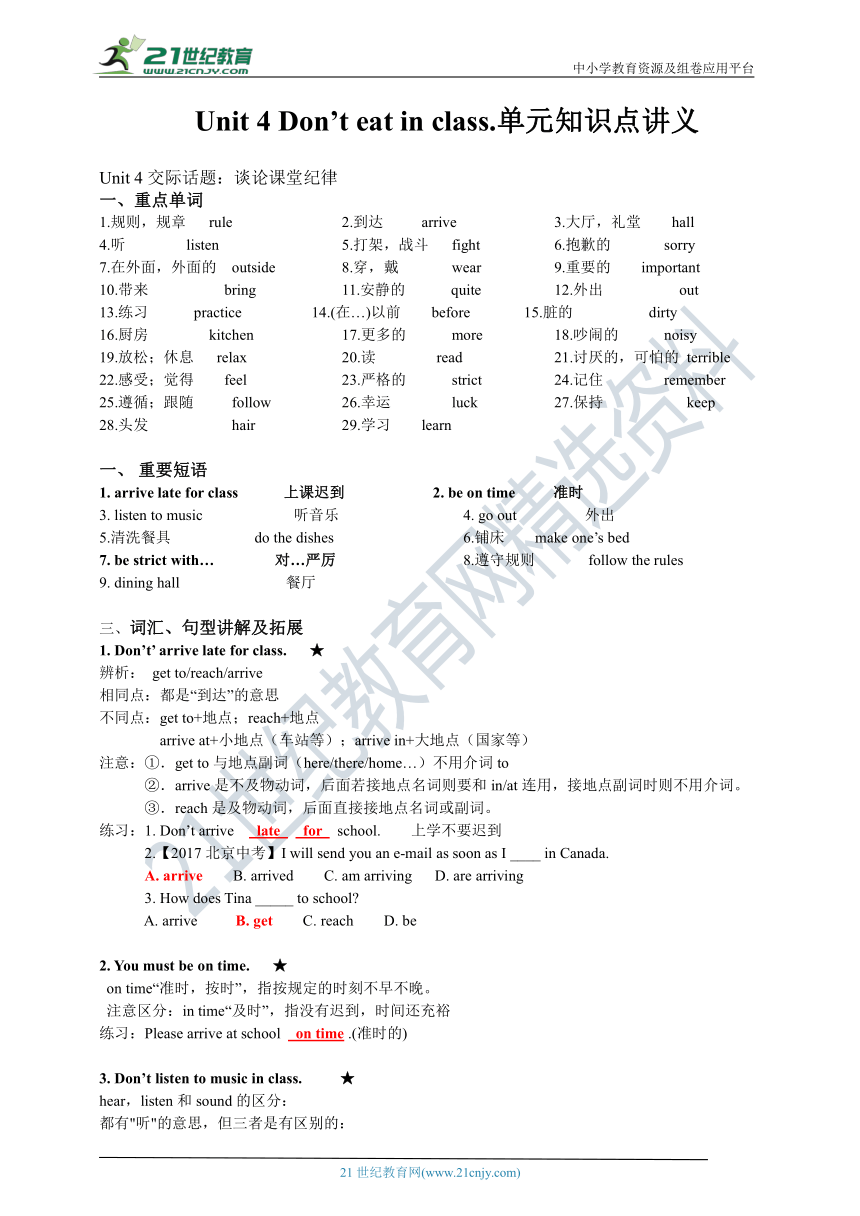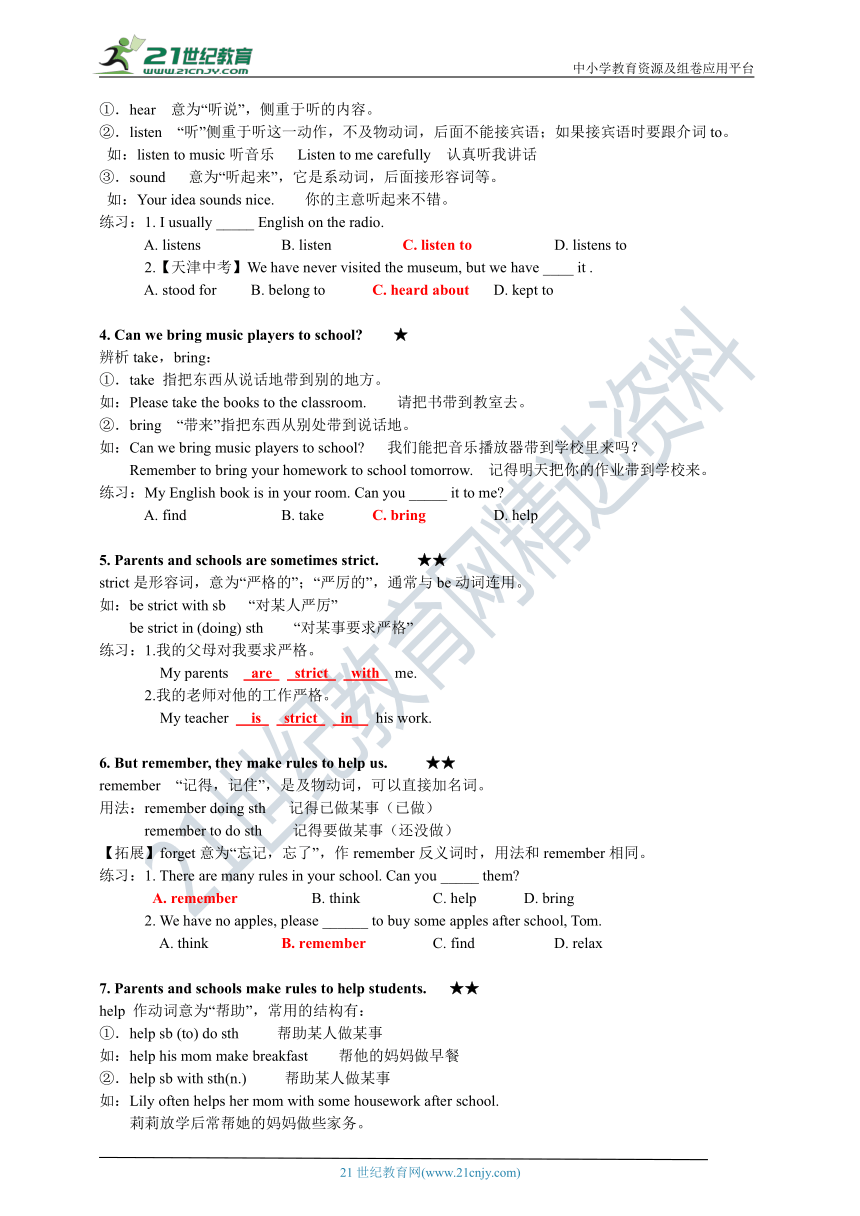Unit 4 Don’t eat in class.单元知识点讲义
文档属性
| 名称 | Unit 4 Don’t eat in class.单元知识点讲义 |

|
|
| 格式 | zip | ||
| 文件大小 | 1.2MB | ||
| 资源类型 | 试卷 | ||
| 版本资源 | 人教新目标(Go for it)版 | ||
| 科目 | 英语 | ||
| 更新时间 | 2020-02-05 15:49:22 | ||
图片预览


文档简介
中小学教育资源及组卷应用平台
Unit 4 Don’t eat in class.单元知识点讲义
Unit 4交际话题:谈论课堂纪律
一、重点单词
1.规则,规章 rule 2.到达 arrive 3.大厅,礼堂 hall
4.听 listen 5.打架,战斗 fight 6.抱歉的 sorry
7.在外面,外面的 outside 8.穿,戴 wear 9.重要的 important
10.带来 bring 11.安静的 quite 12.外出 out
13.练习 practice 14.(在…)以前 before 15.脏的 dirty
16.厨房 kitchen 17.更多的 more 18.吵闹的 noisy
19.放松;休息 relax 20.读 read 21.讨厌的,可怕的 terrible
22.感受;觉得 feel 23.严格的 strict 24.记住 remember
25.遵循;跟随 follow 26.幸运 luck 27.保持 keep
28.头发 hair 29.学习 learn
重要短语
1. arrive late for class 上课迟到 2. be on time 准时
3. listen to music 听音乐 4. go out 外出
5.清洗餐具 do the dishes 6.铺床 make one’s bed
7. be strict with… 对…严厉 8.遵守规则 follow the rules
9. dining hall 餐厅
三、词汇、句型讲解及拓展
1. Don’t’ arrive late for class. ★
辨析: get to/reach/arrive
相同点:都是“到达”的意思
不同点:get to+地点;reach+地点
arrive at+小地点(车站等);arrive in+大地点(国家等)
注意:①.get to与地点副词(here/there/home…)不用介词to
②.arrive是不及物动词,后面若接地点名词则要和in/at连用,接地点副词时则不用介词。
③.reach是及物动词,后面直接接地点名词或副词。
练习:1. Don’t arrive late for school. 上学不要迟到
2.【2017北京中考】I will send you an e-mail as soon as I ____ in Canada.
A. arrive B. arrived C. am arriving D. are arriving
3. How does Tina _____ to school?
A. arrive B. get C. reach D. be
2. You must be on time. ★
on time“准时,按时”,指按规定的时刻不早不晚。
注意区分:in time“及时”,指没有迟到,时间还充裕
练习:Please arrive at school on time .(准时的)
3. Don’t listen to music in class. ★
hear,listen和sound的区分:
都有"听"的意思,但三者是有区别的: ?
①.hear 意为“听说”,侧重于听的内容。 ?
②.listen “听”侧重于听这一动作,不及物动词,后面不能接宾语;如果接宾语时要跟介词to。
如:listen to music听音乐 Listen to me carefully 认真听我讲话
③.sound 意为“听起来”,它是系动词,后面接形容词等。
如:Your idea sounds nice. 你的主意听起来不错。
练习:1. I usually _____ English on the radio.
A. listens B. listen C. listen to D. listens to
2.【天津中考】We have never visited the museum, but we have ____ it .
A. stood for B. belong to C. heard about D. kept to
4. Can we bring music players to school? ★
辨析take,bring:
①.take 指把东西从说话地带到别的地方。
如:Please take the books to the classroom. 请把书带到教室去。
②.bring “带来”指把东西从别处带到说话地。
如:Can we bring music players to school? 我们能把音乐播放器带到学校里来吗?
Remember to bring your homework to school tomorrow. 记得明天把你的作业带到学校来。
练习:My English book is in your room. Can you _____ it to me?
A. find B. take C. bring D. help
5. Parents and schools are sometimes strict. ★★
strict是形容词,意为“严格的”;“严厉的”,通常与be动词连用。
如:be strict with sb “对某人严厉”
be strict in (doing) sth “对某事要求严格”
练习:1.我的父母对我要求严格。
My parents are strict with me.
2.我的老师对他的工作严格。
My teacher is strict in his work.
6. But remember, they make rules to help us. ★★
remember “记得,记住”,是及物动词,可以直接加名词。
用法:remember doing sth 记得已做某事(已做)
remember to do sth 记得要做某事(还没做)
【拓展】forget意为“忘记,忘了”,作remember反义词时,用法和remember相同。
练习:1. There are many rules in your school. Can you _____ them?
A. remember B. think C. help D. bring
2. We have no apples, please ______ to buy some apples after school, Tom.
A. think B. remember C. find D. relax
7. Parents and schools make rules to help students. ★★
help 作动词意为“帮助”,常用的结构有:
①.help sb (to) do sth 帮助某人做某事
如:help his mom make breakfast 帮他的妈妈做早餐
②.help sb with sth(n.) 帮助某人做某事
如:Lily often helps her mom with some housework after school.
莉莉放学后常帮她的妈妈做些家务。
③.help oneself(myself/yourself/herself…) to+ n. 请随便用…
如:Help yourself to some fruits. 随便吃点水果吧。
④.help还可作名词,表示“帮助”,是不可数。
如:Can you give me some help? 能帮我个忙吗?
练习:Mary can _____ his mother ____ the housework on weekends.
A. helps; does B. helps; do C. help; do D. help; does
8. There are too many rules! ★★
too many, too much与much too的区分:
易混词组 意义及用法 例句
too many 形容词,“太,太多”,接可数名词 There are too many people in the park.
too much 形容词,“太多”,接不可数名词 I have too much homework today.
much too 副词,“太,非常”,接形容词或副词 My mother is much too busy.
练习:1. David ate _____ dumplings for dinner, so he feels _____ terrible now.
A. too much; much too B. too many; much too
C. too many; too many D. much too; too much
2. I often go to bed late because I have _____ homework to do every day.
A. too many B. too much C. many too D. much too
?.
四、语法专项
1.情态动词have to 的用法:
意思是“必须、不得不”,它强调客观需要。 ?
①.结构:主语+have/has to+动词原形+其他 ??
如:We have to wear sneakers for gym class. 在体育课上我们必须穿运动鞋。
He has to stay here. 他必须待在这。
I had to get up at 5:00 am last Monday. 上周一我不得不早上5点起床。?
②.否定形式:主语+don't/doesn’t have to+动词原形+其他?
练习:1.【广东中考】 –Can you go to see a movie with us this evening?
-Sorry, I can’t. I ____ take care of my little brother at home because my mother is ill.
A. can B. must C. would D. have to
2.【山西中考】 –I can’t stop smoking, doctor.
-For your health, I’m afraid you ______.
A. may B. need C. have to D. must
2.情态动词must的用法:
must表示说话人的主观看法,及主观上的必要性,还用于命令或愿望。只用于现在时,无人称和单数的变化。在表示过去、将来和完成时,用have to的相应形式来代替must。
.在表示有做某一个动作的必要和义务,它的意思是“必须,应该”。
如:You must finish your homework first. 你必须先完成作业。
② .表示有很大把握的判断或者推测,意思是“一定,准是”。
如:The tall man must be your father. 那个高个子男人一定是你的爸爸。
.以must开头的一般疑问句,它的否定回答用needn’t(不必要),不用mustn’t(不允许),mustn’t常用于否定句中表示“不允许,禁止”。
如:-Must I go there on foot? 我必须得走过去吗?
-No, you needn’t. 不,你不需要。
练习:1.【北京海淀】You _____ cross the road when the traffic lights are red.
A. mustn’t B. can’t C. wouldn’t D. needn’t
2.【上海中考】-Must I go to medical school and be a doctor like you, Dad?
-No, you ____, son. You’re free to make your own decision.
A. can’t B. mustn’t C. shouldn’t D. needn’t
3.【安徽中考】-May I go out now, Dad?
-No. You ____ let your mother know first.
A. can B. may C. need D. must
3. 祈使句
①.定义:用于表达命令、请求、劝告、警告、禁止等的句子叫做祈使句,祈使句最常用于表达命令,②.祈使句因对象(即主语)是第二人称,所以通常都省略。
祈使句的动词都为一般现在时,句末则使用句号或感叹号来表示结束。
③.祈使句的肯定句:行为动词原形+其他
如:Go and wash your hands. 去洗你的手。——命令
Be quiet, please. = Please be quiet. 请安静。——请求
Look out!Danger! 小心!危险!——强烈警告,已如感叹句
Keep off the grass. 勿践草坪。——禁止
④.以Let开头的祈使句,Let后宾语是是第一人称时,否定形式是在宾语后加not。
如:Let’s not do that again. 我们别再那样做了。
如果Let 后面宾语是第三人称,否定形式是在Let前加助动词Don’t。
如:Don’t let them come in. 别让他们进来。
⑤.祈使句的否定通常使用Don't …,Don't+动词原形(行为动词/be动词)+其他
如:Don't let the dog in. 不要让那只狗进来。
Don't touch, please. 请不要用手触摸。
Don't be silly. 别傻了。
练习:1.【扬州中考】-Jim, _____ read books while you are walking in the street. It’s very dangerous.
- OK, thank you.
A. don’t B. doesn’t C. won’t D. can’t
2. ____ me the truth, or I won’t let you leave here.
A. Tell B. To tell C. Telling
3.【杭州中考】- I’m leaving now.
- ______ you turn off the lights.
A. To make sure B. Make sure C. Made sure D. Making sure
21世纪教育网 www.21cnjy.com 精品试卷·第 2 页 (共 2 页)
HYPERLINK "http://21世纪教育网(www.21cnjy.com)
" 21世纪教育网(www.21cnjy.com)
同课章节目录
- Unit 1 Can you play the guitar?
- Section A
- Section B
- Unit 2 What time do you go to school?
- Section A
- Section B
- Unit 3 How do you get to school?
- Section A
- Section B
- Unit 4 Don't eat in class.
- Section A
- Section B
- Unit 5 Why do you like pandas?
- Section A
- Section B
- Unit 6 I'm watching TV.
- Section A
- Section B
- Review of Units 1-6
- Unit 7 It's raining!
- Section A
- Section B
- Unit 8 Is there a post office near here?
- Section A
- Section B
- Unit 9 What does he look like?
- Section A
- Section B
- Unit 10 I'd like some noodles.
- Section A
- Section B
- Unit 11 How was your school trip?
- Section A
- Section B
- Unit 12 What did you do last weekend?
- Section A
- Section B
